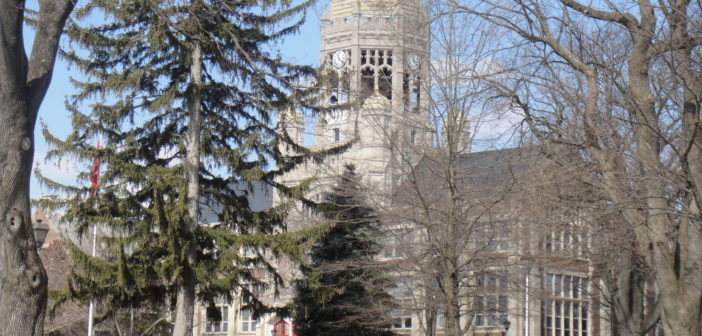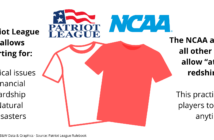Out of 435 congressional districts, all of which are up for grabs on Nov. 6, Pennsylvania’s 7th is distinctive because it is capable of swinging the federal government’s balance of power for the next two years.
The high stakes of the election and the competitiveness of the race in the 7th Congressional District led Christopher Borick, a Muhlenberg political science professor and director of the university’s Institute of Public Opinion, to conduct a poll in an attempt to forecast the outcome of the election.
While Borick most commonly directs polls for statewide and presidential elections, he chose to study the 7th Congressional District because of its unusual attributes.
“The 7th District is one of the more intriguing ones in the country with no incumbent, recent redistricting and it is what we call a ‘Plus one Hillary’ district — which means Clinton would have won the district by one — making this a very middle of the road race,” Borick said. “We definitely wanted to poll to get a better sense of where voters are here.”
The Muhlenberg poll, coordinated in conjunction with The Morning Call, asked about more than just who the 411 likely voter respondents intend to cast their ballots for. It also inquired about which issues were most important to respondents, finding that the economy and health care were nearly tied for the top issue.
While 54 percent of those surveyed said they disapprove of President Donald Trump’s job performance, 42 percent said they approve. Men in the 7th District are evenly split on the congressional race between Susan Wild (D) and Marty Nothstein (R), but women favor Wild by a 51 to 38 percent margin.
Borick said Muhlenberg hasn’t conducted many congressional polls because the college’s district, by nature, hasn’t been competitive in the past. The district, formerly Pennsylvania’s 15th prior to statewide redistricting, hadn’t had a Democrat represent it in the U.S. House since 1999.
“You might say ‘there are 435 districts, why might people care about this one,’ and it’s because it’s in play, and that’s why it’s particularly interesting to study and analyze,” he said.
Borick said the district-wide election is gaining national attention due to the power it possesses to impact national outcomes.
“The one thing that makes this race important is that Democrats are looking to pick up the number of seats this year to gain control of the House (of Representatives),” Borick said. “Districts like this in Pennsylvania are seen as some of the most pivotal ones and that’s why you see a lot of people wanting to see what’s happening here.”
Unlike Muhlenberg, Lehigh doesn’t have a great history in terms of public opinion polling.
Lehigh sociology professor Ziad Munson, who originally founded the recently closed Social Science Research Center at Lehigh, serves as a strong proponent for polling within the university community.
Munson said one of the research center’s principal activities was to conduct surveys on campus, locally and nationwide. Since its closing, surveying is now predominantly conducted by the Center for Community Engagement.
While Lehigh does frequently conduct student opinion polling, the center does not use poll data as scientific research, but instead for university data and betterment.
The lack of polling puts the social sciences, specifically at Lehigh, at a disadvantage, Munson said.
“We no longer have those kinds of resources to offer to both faculty and students,” Munson said. “Polling serves as a great educational purpose, but if you want to use survey results as scientific data then that survey has to be used as a scientific instrument and has to be constructed and calibrated like a scientific instrument.”
Despite Lehigh’s lack of political polling, the congressional race is gaining attention among students and politically-oriented clubs on campus. Malini Ray, ’20, a member of the Student Political Action Coalition, said the 7th District has become so unpredictable because of the national climate.
“This race is especially important because there are so many factors that we’ve never seen before,” Ray said. “(Pennsylvania) was recently redistricted so the (7th Congressional District) is a brand new community looking for representation. Especially since we’re seeing a trend in the resurgence in young voters and minority candidates in federal, state, and local elections, there are so many new voices waiting to be heard, too.”
In order to make sense of polls done in local communities like Muhlenberg’s, FiveThirtyEight has done work to update and maintain a statistical model to help readers understand the nuances of polling outcomes.
FiveThirtyEight’s interactive visualization, which will be continuously updated until Election Day, averages data on all of the polls done for each race. In the case of the 7th Congressional District, that means synthesizing polls from DeSales University, Siena College, Monmouth University and an additional poll from Muhlenberg College done in April 2018.
Though there are three variations of the model, and numbers continue to fluctuate, the ‘classic’ version of the model predicts that Wild has a 94.7 percent chance to win the seat at the time this article was published.






Comment policy
Comments posted to The Brown and White website are reviewed by a moderator before being approved. Incendiary speech or harassing language, including comments targeted at individuals, may be deemed unacceptable and not published. Spam and other soliciting will also be declined.
The Brown and White also reserves the right to not publish entirely anonymous comments.
1 Comment
I wonder about the value of a poll to ordinary citizens because they have the ability to vote in the only poll that counts. “Though there are three variations of the model, and numbers continue to fluctuate, the ‘classic’ version of the model predicts that Wild has a 94.7 percent chance to win the seat at the time this article was published.” This may lead to people thinking their vote is unimportant. If you don’t vote, your vote is unimportant.